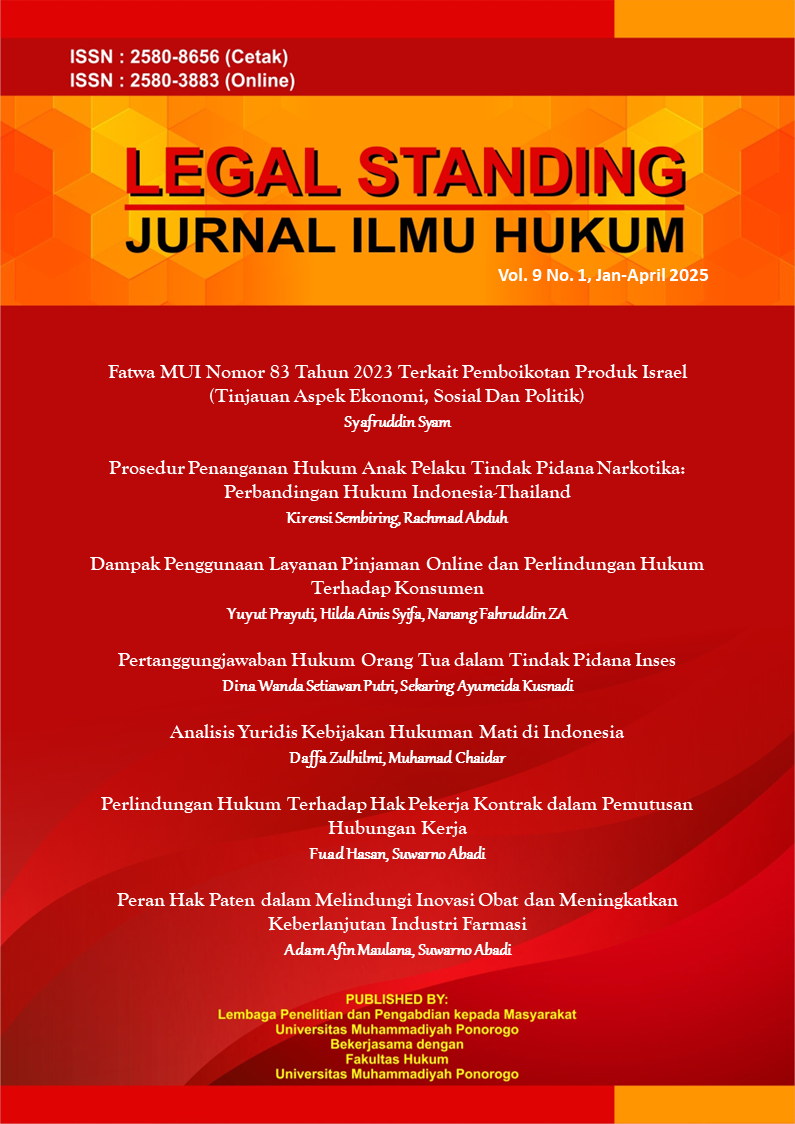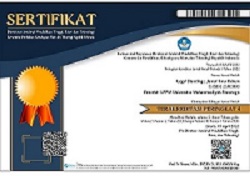Mekanisme Pelaksanaan Restitusi Terhadap Korban Kekerasan Seksual (Studi Komparatif Hukum di Indonesia dan Thailand)
DOI:
https://doi.org/10.24269/ls.v9i1.11387Abstract
Sexual harassment constitutes a form of sexual violence that significantly impacts victims, including psychological, physical, and economic aspects. The mechanism of restitution as a means of restoring the rights of victims has been established through various legal provisions in Indonesia, namely Law Number 12 of 2022 on Sexual Violence Crimes (UU TPKS). Meanwhile, Thailand also regulates restitution mechanisms as a form of victim recovery as outlined in the Child Protection Act of 2546 (2003). However, the implementation of restitution often faces various obstacles, including technical and legal issues. This study aims to examine the mechanisms for implementing restitution for victims of sexual harassment in Indonesia and Thailand, identify emerging obstacles, and present structured proposals for its successful application. Based on normative legal reviews, the study reveals that although regulations are in place, their implementation remains suboptimal due to the lack of inter-agency coordination, limited public legal awareness, and the complexity of calculating compensation for victims. The findings on restitution provisions for sexual harassment victims in Indonesia are regulated through several legal instruments, including Law No. 31 of 2014 in conjunction with Law No. 13 of 2006 on the Witness and Victim Protection Agency, Law No. 12 of 2022 on Sexual Violence Crimes, and Government Regulation No. 35 of 2020 in conjunction with Government Regulation No. 7 of 2018 on Compensation, Restitution, and Assistance for Witnesses and Victims.
References
Agustina, I. (2016). Ketidakefektifan Program Pemerintah Thailand dalam Menjalankan Rekomendasi UNIAP. Jurnal Analisis Hubungan Internasional, 5(2), 507–516. https://journal.unair.ac.id/JAHI@ketidakefektifan-program-pemerintah-thailand-dalam-menjalankan-rekomendasi-uniap-article-11059-media-131-category-8.html
Darmawan, M. R., Kartikahadi, A. D., Rato, D., & Setyawan, F. (2024). Implementasi Hak Restitusi Korban Tindak Pidana Kekerasan Seksual. As-Syar’i: Jurnal Bimbingan & Konseling Keluarga, 6(2), 1–10. https://doi.org/10.47467/as.v6i2.6506
Dewu, C., Rodliyah, R., & Pancaningrum, R. K. (2024). Pelaksanaan Restitusi Terhadap Anak Korban Kekerasan Seksual. Jurnal Risalah Kenotariatan, 5(1), 1–10. https://doi.org/10.29303/risalahkenotariatan.v5i1.203
Faizah, A. F., & Hariri, M. R. (2022). Pelindungan Hukum terhadap Korban Revenge Porn sebagai Bentuk Kekerasan Berbasis Gender Online Ditinjau dari Undang-Undang Nomor 12 Tahun 2022 tentang Tindak Pidana Kekerasan Seksual. Jurnal Hukum Lex Generalis, 3(7), 520–541. https://doi.org/10.56370/jhlg.v3i7.281
Fevernova, F. F., & Firmansyah, H. (2023). Tinjauan Peran LPSK dalam Proses Penegakan Keadilan Terhadap Korban Inses. Unes Law Review, 6(2), 4235–4242. https://doi.org/10.31933/unesrev.v6i2.1262
Gustianti, N. A., Anne, R. O. S., & Erari, G. H. (2023). Remote Sexual Assault Di Thailand: Analisis Berdasarkan Respon Unicef. Review of International Relations, 4(2), 175–187. https://doi.org/10.24252/rir.v4i2.32626
Hidayat, S., & Mahyani, A. (2017). Perlindungan Hukum Bagi Anak Korban Eksploitasi Sebagai Artis. Mimbar Keadilan, 4, 133. https://doi.org/10.30996/mk.v0i0.2190
Jeffries, S., Thipphayamongkoludom, Y., Chuenurah, C., Wood, W. R., & Ryan, M. (2024). Tomboys’ Pathways to Prison in Thailand: Insubordination, Support, Sacrifice, and Suffering. Feminist Criminology, 1–29. https://doi.org/10.1177/15570851241250313
Khumaeroh, I. N. (2023). Kebijakan Hukum Pidana Terhadap Perkembangan Tindak Pidana Kekerasan Seksual yang Bertujuan Menciptakan Keadilan Gender. Jurnal Hukum Indonesia, 2(2), 53–59. https://doi.org/10.58344/jhi.v2i2.14
Millatina, A. H., & Hanura, M. (2018). Peran ECPAT dalam Menangani Eksploitasi Seksual Komersial Anak di Indonesia. Journal of International Relations Diponegoro, 4(3), 536–546. https://doi.org/10.14710/jirud.v4i3.21079
Mulia, F. D., Karneli, Y., & Netrawati, N. (2024). Systematic Literature Review : Layanan Bimbingan Kelompok Dengan Pendekatan Person Centered Untuk Mencegah Kekerasan Seksual Pada Remaja Perempuan. Counselia; Jurnal Bimbingan Konseling Pendidikan Islam, 5(2), 371–381. https://doi.org/10.31943/counselia.v5i2.167
Omega, C., Murdani, A. D., & Widhiyoga, G. (2023). Upaya Multi Track Diplomacy Pemerintah Thailand dalam Menangani Permasalahan Perdagangan Manusia di Thailand pada 2015-2017. Indonesian Journal of Peace and Security Studies (IJPSS), 5(1), 34–55. https://doi.org/10.29303/ijpss.v5i1.122
Rambe, M. S. I., & Rahmi, A. (2024). Perlindungan Anak Korban Kekerasan Seksual (Studi Komparatif: Hukum Nasional Dan Hukum Thailand). 5(1), 20–30. https://doi.org/10.46576/lj.v5i1.5396
Rizdyanti, P. C., Dewi, A. A. S. L., & Widyantara, I. M. M. (2021). Perlindungan Hukum terhadap Anak Sebagai Korban Eksploitasi Seksual Komersial di Media Sosial. Jurnal Konstruksi Hukum, 2(2), 332–337. https://doi.org/10.22225/jkh.2.2.3232.332-337
Septia, G. K., & Suhartini, S. (2024). Kepentingan Restitusi dalam Sistem Peradilan Pidana Sebagai Sarana Pemulihan Korban Kekerasan Seksual. Jurnal Syntax Imperatif : Jurnal Ilmu Sosial Dan Pendidikan, 4(6), 916–928. https://doi.org/10.36418/syntax-imperatif.v4i6.334
Serah, Y. A., Hastian, T., Setiawati, R., Sitorus, A. P. M. C., & Loin, R. (2023). Perlindungan Hukum terhadap Anak Korban Eksploitasi Seksual Komersial di Daerah Perbatasan Kalimantan Barat Legal Protection Against Child Victims of Commercial Sexual Exploitation In the Border Region of West Kalimantan. Jurnal Kolaboratif Sains, 11(November), 1510–1518. https://doi.org/10.56338/jks.v6i11.4363
Suitela, M. B., & Alputila, M. J. (2023). Pemberian Hak Restitusi Terhadap Anak Sebagai Korban Tindak Pidana Kekerasan Seksual. Jurnal Restorative Justice, 7(1), 56–70. https://doi.org/10.35724/jrj.v7i1.5238
Syifaturohmah, S., Zulianti, A. D., Aisyah, A. N., Cahyanengsih, I., Mastuti, R. D., & Rizky, L. (2024). Efektivitas Konvensi Hak Anak ( ICRC ) Dalam Kasus Eksploitasi Anak di Thailand ( Studi Kasus Tahun 2019-2022 ). WISSEN : Jurnal Ilmu Sosial Dan Humaniora, 2(3), 154–171. https://doi.org/10.62383/wissen.v2i3.173
Widhi, M. N. C., & Wahyudi, F. E. (2018). Peran Pemerintah Thailand Dalam Menanggulangi Eksploitasi Seksual Komersial Anak Di Thailand. Journal of International Relations, 4(4), 730–738. https://doi.org/10.14710/jirud.v4i4.21976
Downloads
Published
How to Cite
Issue
Section
License

Legal Standing : (Jurnal Ilmu Hukum) is licensed under a Lisensi Creative Commons Atribusi-BerbagiSerupa 4.0 Internasional.

.png)

